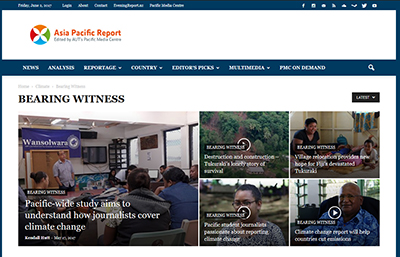By Mackenzie Smith
Student journalists returning from a mission to Fiji, where they have been reporting the effects of climate change, say it is hitting the region hard.
The Bearing Witness project is a collaboration between AUT's Pacific Media Centre and the University of the South Pacific, with a focus on highlighting the impact climate change has on the Pacific.
Julie Cleaver, a Communication Studies Honours student journalist and Debate editor, and Pacific Media Watch contributing editor Kendall Hutt spent two weeks in Fiji last month as part of the mission.
Hutt said the Bearing Witness programme, which is in its second year, was a good learning experience for young journalists wanting to understand the Pacific region.
The pair said the effects of climate change on Fiji were happening now and were more than just rising sea levels.
“When you get talking to the people, it was immediate very quickly because they mentioned it was affecting their lives and the lives of their parents,” said Cleaver.
Hutt said there was a perception outside of the Pacific that climate change wasn’t having an impact but that in Fiji people were “ living with it every day”.
Paris agreement important
She said when she arrived in late April there were heavy rainstorms as well as nearby Cyclone Donna and Ella, which were all much later in the season than normal.
 “In some parts of Fiji it’s too wet and it’s raining and in other parts you have people suffering with drought,” said Cleaver.
“In some parts of Fiji it’s too wet and it’s raining and in other parts you have people suffering with drought,” said Cleaver.
Hutt said seeing the change first hand made her realise how important the implementation of policy like the Paris Climate Agreement was for regions hit first by climate change like the Pacific.
“There was an acceptance that climate change won’t stop, it can’t stop but any actions you take in mitigating its ongoing effects is massive for the region,” said Hutt.
The Paris Agreement, signed in 2015 by almost 200 United Nations members, has the primary goal of reducing greenhouse gas emissions enough to keep global temperatures below 2 degrees celsius by the end of the century.
During their trip, the two journalists followed the journey of people from the village of Tukuraki in the Fiji highlands of Ba, Viti Levu, who have been forced to relocate three times after landslides and cyclones destroyed their homes.
However, Hutt said the people of Tukuraki were resilient and “not just accepting of their fate”, but willing to adapt and fight climate change.
“People in the Pacific don’t see themselves as victims of climate change, they aren’t just letting it happen to them.”
The project is a collaboration between AUT's Pacific Media Centre and Te Ara Motuhenga documentary collective, and USP's Pacific Centre for Environment and Sustainable Development (PacE-SD) and Regional Journalism Programme. Below: A video about the project made by Cleaver and Hutt featuring PMC director Professor David Robie.
The story of Tukuraki village in Fiji + video report



